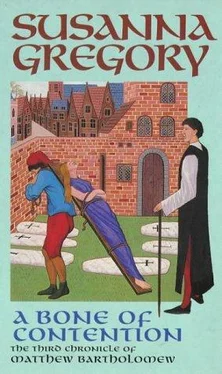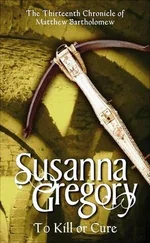Susanna Gregory
A BONE OF CONTENTION
1997
Cambridge, 1327
Breath coming in painful gasps, D’Ambrey ran even harder. His lungs felt as though they would explode, and his legs burned with the agony of running. He reached an oak tree, and clutched at its thick trunk as he fought to catch his breath. A yell, not too far away, indicated that the soldiers had found his trail, and were chasing him once again. Weariness gave way to panic, and he forced himself to move on.
But how long could he continue to run before he dropped? And where could he go? He pushed such questions from his mind, and plunged on into the growing shadows of dusk. His cloak caught on a branch, and, for a few terrifying seconds, he could not untangle it. But the cloak tore, and he continued his mindless running.
He burst out from the line of trees and came on to the High Street, skidding to a halt. At sunset the road was busy with people returning home after a day of trading in the Market Square. People stopped as they saw him. His green cloak with the gold crusader’s cross emblazoned on the back was distinctive, and everyone knew him.
He elbowed his way through them towards the town gate, but saw soldiers there. He could not go back the way he had come, so the only option was to make his way along the raised banks of the King’s Ditch. The King’s Ditch was part fortification and part sewer. It swung in a great arc around the eastern side of the town, a foul, slow-moving strip of water, crammed with the town’s waste and a thick, sucking mud washed from the Fens. There had been heavy rains with the onset of autumn, and the Ditch was a swirling torrent of brown water that lapped dangerously close to its levied banks.
D’Ambrey scrambled up the bank, mud clinging to his hands and knees and spoiling his fine cloak. He saw the soldiers break through the trees on to the road, pushing through the people towards him, and turned to race away from them along the top of the bank. But it was slippery, and moving quickly was difficult. The soldiers spotted him, and were coming across the strip of grass below, beginning to overtake him.
It was hopeless. He stopped running, and stood still.
His cloak billowed around him in the evening breeze, blowing his copper-coloured hair around his face. The soldiers, grinning now that their quarry was run to a halt, began to climb up the bank towards him. Knowing he was going to die, he drew his short dagger in a final, desperate attempt to protect himself.
He heard a singing noise, and something hit him hard in the throat. He dropped the dagger and raised his hands to his neck. He felt no pain, but could not breathe. His fingers grasped at the arrow shaft that was lodged at the base of his throat. The world began to darken, and he felt himself begin to fall backwards. The last thing he knew was the cold waters of the Ditch closing over him as he died.
September 1352
‘What, again?’ asked Matthew Bartholomew incredulously, watching Brother Michael for some sign of a practical joke.
Michael rubbed his fat, white hands together with a cheery grin. ‘I am afraid so, Doctor. The Chancellor requests that you come to examine the bones that were found in the King’s Ditch by the Hall of Valence Marie this morning. He wants you to make an official statement that they do not belong to Simon d’Ambrey.’
Bartholomew sighed heavily, picked up his medical bag from the table and followed Michael into the bright September sunshine. It was mid-morning and term was due to start in three days. Students were pouring into the small town of Cambridge, trying to secure lodgings that were not too expensive or shabby, and conducting noisy reunions in the streets. Although Bartholomew did not yet have classes to teach, there was much to be done by way of preparation, and he did not relish being dragged from his cool room at Michaelhouse, into the sweltering heat, on some wild-goose chase for the third time that week.
As he and Brother Michael emerged from the College, Bartholomew wrinkled his nose in disgust at the powerful aroma wafted on the breeze from the direction of the river. Cambridge was near the Fens, and lay on flat, low lard that was criss-crossed by a myriad of waterways. To the people who lived there these were convenient places to dispose of rubbish, and many of the smaller ditches were continually blocked because of it.
The summer had been long, hot and dry, and the waterways had been reduced to trickles. People had made no attempt to find other places to rid themselves of their rubbish, and huge blockages had occurred, growing worse as summer had progressed. The first autumn rains had seen the choked waterways bursting their banks, flooding houses and farms with filthy, evil-smelling water.
The situation could not continue, and, for once, the town and the University had joined forces, and a major ditch-clearing operation was underway. The University was responsible for dredging the part of the King’s Ditch that ran alongside the recently founded Hall of Valence Marie.
Michael headed for the shady side of the road, and began to walk slowly towards Valence Marie. The High Street was busy that Saturday, with traders hurrying to and from the Market Square with their wares. A ponderous brewery cart was stuck in one of the deep ruts that was gouged into the bone-dry street, and chaos ensued when other carts tried to squeeze past it. A juggler sat in the stocks outside St Mary’s Church, and entertained a crowd of children with tricks involving three wizened apples and a hard, green turnip. His display came to an abrupt end when a one-eyed, yellow dog made off with the turnip between its drooling jaws.
‘Have you seen these bones that have been dredged up?’ Bartholomew asked, striding next to the Benedictine monk.
Michael nodded, plucking at Bartholomew’s tabard to make him slow down. Bartholomew glanced at him.
Already there were small beads of perspiration on the large monk’s pallid face, and he pulled uncomfortably at his heavy habit.
‘Yes. I am no physician, Matt, but I am certain they are not human.’
Bartholomew slowed his pace to match Michael’s ambling shuffle. ‘So why bother me?’ he asked, a little testily. ‘I am trying to finish a treatise on fevers before the beginning of term, and there is a constant stream of students wanting me to teach them.’
Michael patted his arm consolingly. ‘We are all busy, Matt – myself included with these new duties as Senior Proctor. But you know how the townspeople are. The Chancellor insisted that you come and pronounce that these wretched bones are from an animal to quell any rumours that they belong to Simon d’Ambrey.’
‘Those rumours are already abroad, Brother,’ said Bartholomew, impatiently. ‘If the townspeople are to be believed, d’Ambrey’s bones have been uncovered in at least six different locations.’ He laughed suddenly, his ill-temper at being disturbed evaporating as he considered the ludicrous nature of their mission. ‘As a physician, I can tell you that d’Ambrey had about twenty legs, variously shaped like those of sheep and cows; four heads, one of which sprouted horns; and a ribcage that would put Goliath to shame!’
Michael laughed with him. ‘Well, his leg-count is likely to go up again today,’ he said. ‘You may even find he had a tail!’
They walked in companionable silence until Michael stopped to buy a pastry from a baker who balanced a tray of wares on his head. Bartholomew was dissuaded by the sight of the dead flies that formed a dark crust around the edge of the tray, trapped in the little rivers of syrup that had leaked from the cakes.
Voices raised in anger and indignation attracted their attention away from the baker to a group of young men standing outside St Bene’t’s Church. The youths wore brightly coloured clothes under their dark students’ tabards, and in the midst of them were two black-garbed friars who were being pushed and jostled.
Читать дальше












